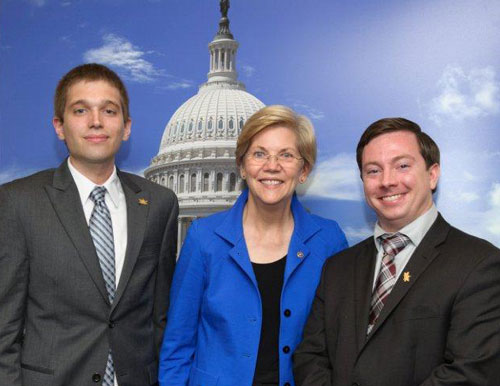NSE students meet with nuclear energy policy-makers

The 2014 Nuclear Engineering Student Delegation (NESD) convened on July 6th to prepare an independent policy statement in advance of a week of meetings with nuclear industry representatives, executive offices, and legislative offices. Graduate students Daniel Curtis, Matthew Ellis, and Jake Jurewicz from the MIT Department of Nuclear Science and Engineering represented MIT in this year's 17-member delegation.
Curtis, Ellis and Jurewicz first met with Senator Elizabeth Warren (D-MA), and later with the energy and technology specialists on the staffs of Senator Warren, Senator Ed Markey (D-MA), Congressman Michael Capuano (D, MA-7), Congresswoman Katherine Clark (D, MA-5), and Congressman Stephen Lynch (D, MA-8). The MIT contingent used the time with Senator Warren to discuss the unique scientific value of the Alcator C-Mod tokamak facility and thank the senator for her support for that facility’s funding. NESD policy priorities, particularly funding for undergraduate and graduate nuclear engineering education, were also discussed
In addition to their Massachusetts visits, the MIT contingent met with numerous offices for representatives and senators in their home states (Curtis from Texas, Ellis from Pennsylvania, and Jurewicz from Illinois) and members of critical congressional committees (House Energy and Water Development, Senate Energy and Commerce, and Appropriations in each chamber). By the end of the week, Curtis, Ellis and Jurewicz had met with over 50 congressional offices.
These meetings provided the opportunity to inform Congressional staffers about nuclear energy issues and the delegation’s policy priorities and to learn about the positions and priorities of the Congressman or Senator.
NESD delegates also met with industry and executive agency leaders. These included Nuclear Energy Institute CEO Marvin Fertel, Department of Energy Assistant Secretary for Nuclear Energy Dr. Pete Lyons, NRC Commissioner William Magwood, and representatives of the Office of Science and Technology Policy, Environmental Protection Agency, and AREVA. These meetings provided the delegation with background knowledge on government operations and insights into current events and activities of government agencies involved in nuclear science and engineering.
About NSED
NESD is a student-run organization that gathers for one week each summer in Washington, DC to advocate for sound government policy on nuclear technology development, nuclear security, and nuclear science and engineering education. NESD members are selected by the student chairs of the organization from among a talented set of undergraduate and graduate applicants from universities across the United States. MIT has been consistently well represented, with at least two delegates selected each year since 2007.
The 2014 NESD developed four major policy priorities:
- The delegation supports continuing funding for the Integrated University Program (IUP), the only US federal program dedicated to funding nuclear science and engineering education. This program supports nuclear science and engineering students at universities across the country through the Department of Energy (DOE) Nuclear Energy University Program and through scholarships and fellowships from the Nuclear Regulatory Commission and National Nuclear Security Foundation.
- The delegation also opposes the efforts currently proposed by the Office of Management and Budget to consolidate federal science, technology, engineering, and math (STEM) education programs into a small number of federal agencies, which would eliminate many specialized programs like IUP.
- The delegation supports continuing funding for technology development and licensing of Small Modular Reactors.
- The delegation recommends approval of the civil nuclear cooperation agreement between the United States and Vietnam, currently under review in Congress.
- The delegation recommends re-authorization of the charter of the United States Export-Import Bank, which provides capital for large industrial projects that include nuclear reactor and component exports
Photo: Left to right: Matthew Ellis, Senator Elizabeth Warren, Daniel Curtis
